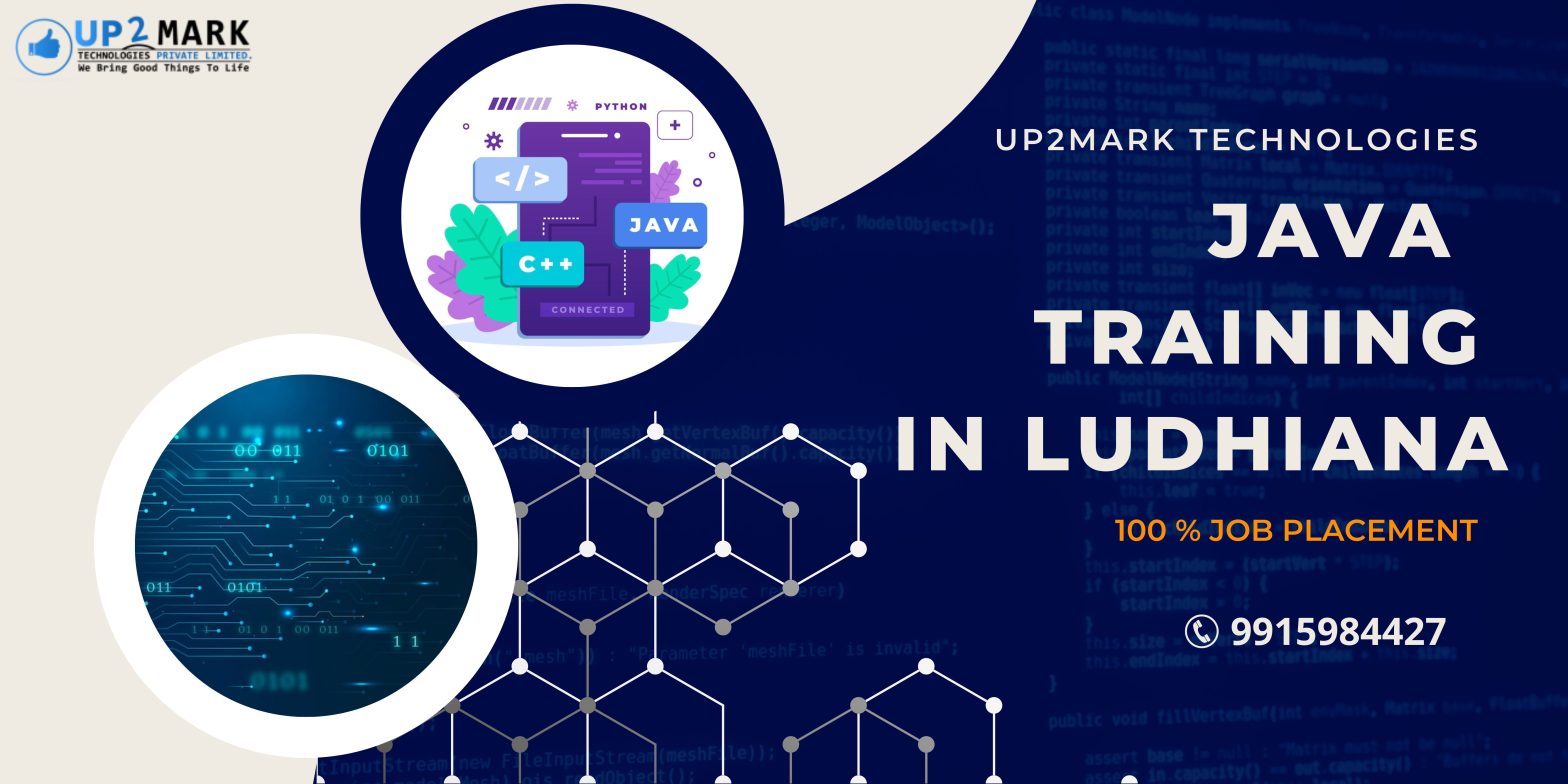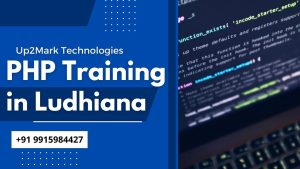Java training in Ludhiana | 100% Job Placement
Introduction
Up2Mark Technologies is a leading Java training institute in Ludhiana with an excellent team of certified and experienced professionals. The course curriculum is designed as per the
latest industry trends and covers all the aspects of Java programming language.
What is Java?
Java is a programming language that was first released in 1995. It is a versatile language
that can be used for developing a variety of applications, from small programs to large
enterprise systems. Java is a popular language among developers because it is easy to
learn and has a wide range of tools and libraries available.
UpMark Technologies offers Java training in Ludhiana for those who want to learn how to
develop applications using this versatile language. Our courses are designed to give
students the skills they need to become proficient in Java programming. We offer both basic
and advanced courses, so there is something for everyone.
Our Java courses cover topics such as data types, control structures, object-oriented
programming, and GUI development. Students will learn how to use the Java Development
Kit (JDK) and other tools to create and debug programs. By the end of the course, students
will be able to develop their own Java applications.
Features of Java
UpMark Technologies provides Java training in Ludhiana. The course covers all the
important aspects of the language, from its basic features to more advanced topics.
Some of the key features of Java that are covered in the training include object-oriented
programming, exception handling, and multithreading. These are essential concepts that any
programmer should know. The course also covers topics such as file input/output and
networking.
The training is conducted by experienced instructors who are well-versed in the language.
They use a variety of teaching methods to ensure that students understand the concepts
being taught. The course is also interactive, with plenty of opportunity for students to ask
questions and get help when needed.
Overall, UpMark Technologies provides an excellent Java training course that covers all the
important aspects of the language.
Pros and Cons of Java
Java is a versatile and powerful programming language that enables developers to create
robust, high-performance applications. However, there are some pros and cons to consider
before deciding if Java is the right language for your project.
One of the biggest advantages of Java is its platform independence. This means that
applications written in Java can run on any system that has a Java Virtual Machine (JVM)
installed. This makes Java ideal for developing cross-platform applications. Another
advantage of Java is its security. Java enables developers to create applications that are
secure from malware and other attacks.
However, there are some drawbacks to using Java. One downside is that it can be slower
than other programming languages, such as C++. Another potential drawback is that it
requires more memory than some languages. As a result, Java may not be the best choice
for resource-intensive applications.
Why learn Java?
There are many reasons to learn Java. Java is a versatile and powerful programming
language that can be used for a wide variety of applications.
Java is the most popular programming language in the world, and it is used by millions of
developers. This means that there is a large community of developers who can help you if
you run into any problems.
Java is also very versatile. It can be used for developing desktop applications, web
applications, and even mobile apps. Java is also widely used in big data and machine
learning.
Finally, learning Java will give you a valuable skill that will make you more marketable to
employers. Java programmers are in high demand, and they usually command high salaries.
If you want to make a good career for yourself, learning Java is a great place to start.
Course Content and Syllabus for Java Syllabus
Topics under Java Course Syllabus
- Core Java
- Advanced Java
Module 1: Introduction
- Java Why? What? How? When? Where?
- Different Java Versions
- How Java is different from other Technologies
Module 2: Introduction To Java Programming Environment
- How to Install & Set Path
- A Simple Java Program
- Compiling & executing Java Program
- Phases of Java Program
- Analysis of a Java Program
- Understanding Syntax and Semantic Error
- Runtime Exception
- Name of a Java Source File
- Platform Independency
- Java Technology (JDK, JRE, JVM, JIT)
- Features of Java
- Text Editors
- Consoles
Module 3: Fundamentals of Java Programming
- The naming convention of Java language
- Comments, Statements
- Blocks (Static, Non-static/instance)
- Identifiers, Keywords, Literals
- Primitive Data Types, Range
- Reference (User-defined) Data type
- Variables (Primitive, Reference)
- Type Casting, Default Value
- Operators
Module 4: Control Structures
- Working with Control Structures
- Types of Control Structures
- Decision Control Structure (if, if-else, if-else if, switch –case)
- Repetition Control Structure (do-while, while, for)
Module 5: Input Fundamentals And Datatypes In Java
- Java program inputs from Keyboard
- Methods of Keyboard inputs
- Scanner, Buffered Reader
- Problem Solving
- Java Array
- Instantiation of an Array
- String vs character array Accessing Array
- Elements, Default Value, for-each loop, var args
- Length of an Array (What is –Array Index Out Of Bounds Exception)
- Increasing, Decreasing the Size and Copy of an Array
- Multi-Dimensional Arrays
- Application Compilation and Run
Module 6: Object-Oriented Programming (Oops Concepts In Deep) (Duration-4hrs)
- Procedural Vs Object-Oriented Program
- Different types of Program Procedural Vs Object Oriented.
- Top-Down Vs Bottom-Up Approach
- Introduction to Object-Oriented
- Abstraction, Encapsulation, Inheritance
- Polymorphism
- Introduction to Classes and Objects
- Custom Class Definition
- Instance and Static Variables
- Different ways to create Object Instance
- Instance Variable and its role in a Class
- Constructors, types of Constructor, Constructor Rule, Constructor Overloading
- Static Variable and its use
- Methods and their behavior
- Constructor vs Methods
- “this” Keyword
- Java Access Modifiers (and Specifiers)
- Call by value, Call by reference
Module 7: Command-Line Arguments
- What is a Command-Line Argument?
- Java Application with Command-Line Arguments
- Conversion of Command-Line Arguments
- Parsing Command-Line Arguments
- Using methods (Static, Non-Static)
Module 8: Integrated Development Environment
- Using various Editors
- Program Compilation, Execution in Editor
- Using Eclipse IDE
- Project Set-Up
- Source File Generation
- Application Compilation and Run
Module 9: Inner Class
- First View of Inner Class
- Outer Class Access
- Types of Inner Class
Module 10: Inheritance
- Complete concepts of Inheritance
- Sub-Classes
- Object Classes
- Constructor Calling Chain
- The use of “super” Keyword
- The use of “private” keyword inheritance.
- Reference Casting
Module 11: Abstract Classes and Inheritance
- Introduction to Abstract Methods
- Abstract Classes and Interface
- Interface as a Type
- Interface v/s Abstract Class
- Interface Definition
- Interface Implementation
- Multiple Interfaces’ Implementation
- Interfaces’ Inheritance
- How to create the object of Interface
Module 12: Polymorphism (Duration-1hr)
- Introduction to Polymorphism
- Types of Polymorphism
- Overloading Methods
- Overriding Methods
- Hiding Methods
- Final Class and Method
- Polymorphic Behavior in Java
- Benefits of Polymorphism
- “Is-A” vs “Has-A”
- Association Vs Aggregation
Module 13: Package
- Package and Classpath and its use
- First, look into Packages
- Benefits of Packages
- Package Creation and Use
- First, look into the Classpath
- Classpath Setting
- Class Import
- Package Import
- Role of public, protected, default and private w.r.t package
- Namespace Management
- Package vs Header File
- Creating and Using the Sub Package
- Sources and Class Files Management
Module 14: Using Predefined Package & Other Classes
- Java.lang Hierarchy
- Object class and using toString(), equals(),hashCode(), clone(), finalize() etc
- Using Runtime Class, Process Class to play music, video from Java Program
- Primitives and Wrapper Class
- Math Class
- String, StringBuffer, StringBuilder Class
- String Constant Pool
- Various usage and methods of String, StringBuffer, StringBuilder
- Wrapper Classes
- System Class using GC(), exit(), etc.
Module 15: New Concepts In Package
- Autoboxing and Auto unboxing
- Static import.
- The instance of the operator.
- Enum and its use in Java
- Working with jar
Module 16: Garbage Collection
- Garbage Collection Introduction
- Advantages of Garbage Collection
- Garbage Collection Procedure
- Java API
Module 17: Exception Handling
- Introduction to Exceptions
- Effects of Exceptions
- Exception Handling Mechanism
- Try, catch, finally blocks
- Rules of Exception Handling
- Exception class Hierarchy, Checked & Unchecked Exception
- Throw & throws keyword
- Custom Exception Class
- Chained Exception
- Resource handling & multiple exception class
Module 18: Multithreading (Duration-3hrs)
- Introduction
- Advantages
- Creating a Thread by inheriting from Thread class
- Run() and start() method
- The constructor of Thread Class
- Various Method of Thread Class
- Runnable Interface Implementation
- Thread Group
- The Thread States and Priorities
- Synchronization method, block
- Class & Object Level Lock
- Deadlock & its Prevention
- Inter thread Synchronization
- Life Cycle of Thread
- Deprecated methods : stop(), suspend(),resume(), etc
Module 19: Input and Output Streams (Duration-3hrs)
- Java I/O Stream
- I/O Stream – Introduction
- Types of Streams
- Stream Class Hierarchy
- Using File Class
- Copy and Paste the content of a file
- Byte Streams vs Character Streams
- Text File vs Binary File
- Character Reading from Keyboard by Input Stream Reader
- Reading a Line/String from Keyboard by Buffered Reader
- Standard I/O Streams Using Data Streams to read/write
- primitive data
- PrintStream vs PrintWriter Using StreamTokenizer and RandomAccessFile
Up2Mark Technologies- The best place for Java training in Ludhiana
Up2Mark Technologies is the best place for Java training in Ludhiana. We provide the best
quality training to our students so that they can excel in their career.
We have a team of experienced and qualified trainers who are experts in their field. They will
train you according to the latest industry standards so that you can stay ahead of the
competition.
We also have a state-of-the-art infrastructure and facilities that are necessary for providing
an excellent learning experience.
So if you are looking for the best Java training institute in Ludhiana, look no further than
Up2Mark Technologies!
Conclusion
If you’re looking for Java training in Ludhiana, then Up2Mark Technologies is the perfect
place for you. We offer a wide range of courses that will suit your needs and help you to become a Java expert. With our experienced trainers and state-of-the-art facilities, we are
confident that we can provide you with the best possible education and support. Contact us
today to find out more about our services and how we can help you achieve your goals.
- 📞 99159 84427, 9915900118
- 📧 [email protected]
- 🌐 https://up2mark.com/
Gagan Virpal is a digital marketing expert and content writer at Up2Mark Technologies. She has more than Two years of experience in the field of online marketing and content writing. Gagan is passionate about creating high-quality, engaging content that helps businesses achieve their marketing goals.
Latest posts by Gagan Virpal (see all)
- Shopify website Development Services - September 17, 2022
- SEO Company in Ludhiana | SEO Services Provider In Punjab - September 5, 2022
- AngularJS and Node.js Apps Training in Ludhiana with MEAN Stack - August 26, 2022
Get A Call From Us
Client Reviews
Contact Us
3rd Floor, PC Tower Opposite GNE College, Gill Rd, Ludhiana, Punjab





